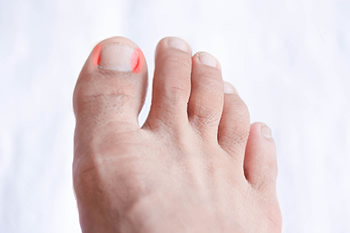 An ingrown toenail is defined as a nail that grows into the outside edges of the skin. It generally affects the big toe and can cause severe pain and discomfort. It can occur as a result of wearing shoes that do not have adequate room for the toes to move freely in, or possibly from genetic factors. Additionally, the shape of the nail may be conducive to developing an ingrown toenail. Research has indicated that ingrown toenails may happen more often in children and pregnant women. This can be a result of the accelerated speed of the nail growth. Mild relief may be found when the affected toe is soaked in warm water which can be beneficial in pulling the nail away from the softened skin. An ingrown toenail can easily become infected if not promptly treated. If you are afflicted with this ailment it is strongly suggested that you speak with a podiatrist who can properly treat this condition.
An ingrown toenail is defined as a nail that grows into the outside edges of the skin. It generally affects the big toe and can cause severe pain and discomfort. It can occur as a result of wearing shoes that do not have adequate room for the toes to move freely in, or possibly from genetic factors. Additionally, the shape of the nail may be conducive to developing an ingrown toenail. Research has indicated that ingrown toenails may happen more often in children and pregnant women. This can be a result of the accelerated speed of the nail growth. Mild relief may be found when the affected toe is soaked in warm water which can be beneficial in pulling the nail away from the softened skin. An ingrown toenail can easily become infected if not promptly treated. If you are afflicted with this ailment it is strongly suggested that you speak with a podiatrist who can properly treat this condition.
Ingrown toenails can become painful if they are not treated properly. For more information about ingrown toenails, contact Dr. James D. McAlexander of Gig Harbor Foot and Ankle Clinic. Our doctor can provide the care you need to keep you pain-free and on your feet.
Ingrown Toenails
Ingrown toenails occur when a toenail grows sideways into the bed of the nail, causing pain, swelling, and possibly infection.
Causes
- Bacterial infections
- Improper nail cutting such as cutting it too short or not straight across
- Trauma to the toe, such as stubbing, which causes the nail to grow back irregularly
- Ill-fitting shoes that bunch the toes too close together
- Genetic predisposition
Prevention
Because ingrown toenails are not something found outside of shoe-wearing cultures, going barefoot as often as possible will decrease the likeliness of developing ingrown toenails. Wearing proper fitting shoes and using proper cutting techniques will also help decrease your risk of developing ingrown toenails.
Treatment
Ingrown toenails are a very treatable foot condition. In minor cases, soaking the affected area in salt or antibacterial soaps will not only help with the ingrown nail itself, but also help prevent any infections from occurring. In more severe cases, surgery is an option. In either case, speaking to your podiatrist about this condition will help you get a better understanding of specific treatment options that are right for you.
If you have any questions please feel free to contact our office located in Gig Harbor, WA . We offer the newest diagnostic and treatment technologies for all your foot and ankle needs.
